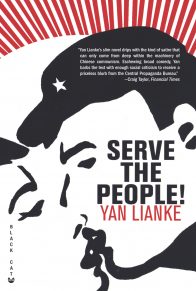“If you’ve ever spent a sleepless night worrying about your career, your family and the gross inequality of American life, then chances are you will love, or at least relate to, The Guest Lecture . . . A quirky second novel of breathtaking genius.”—Ann Levin, AP News
“It’s difficult to talk with Martin Riker and not feel hopeful . . . Talking with him, and reading his new book, The Guest Lecture, lit me up in thrilling ways about all the possibilities still alive—at least for books . . . Ebullient, lively, often very funny; Abby describes what’s most important to her in writing as ‘the life inside the language,’ and this whole book is so gleefully, wondrously full of that life.”—Lynn Steger Strong, Los Angeles Times
“Mesmerizing . . . The Guest Lecture is a novel of ideas and feelings, of feelings about ideas and ideas about feelings. If this lecture will be her final word on her subject, Abigail naturally wants to express everything. Living in ‘an era of overload’ can feel like a rush, and the book doesn’t deny us that. It bursts with philosophy, jokes, factoids, tense academic social dynamics and fragments of formative memory.”—Maggie Lange, Washington Post
“Chronicles the thoughts of a depressed economist named Abby over a single sleepless night as she lies in a hotel bed beside her husband, Ed, and daughter, Ali . . . The novel Riker has constructed around her nightlong monologue subtly puts her separation from the rest of existence into question . . . The novel itself is governed by a finely orchestrated sense of instability. Riker punctuates the chatty narration with abrupt bursts of self-castigation as Abby struggles to seize the reins of her runaway mind . . . [A] strange little novel of cosmopolitan solipsism.”—Nathan Goldman, New Yorker, “Page Turner”
“The novel’s juggling act is in combining an affectionate depiction of Abigail’s neuroses with a contemplation of ideas, specifically those connected to Keynes’s economic theories, which it fascinatingly unpacks. Keynes’s humanistic optimism for the future of civilization serves as a challenge to Abigail’s habit of regret, and in the dialectic between them Mr. Riker skips among a multitude of issues, from Abigail’s trenchant commentary on sexism in academia to her wry memories of broken relationships.”—Sam Sacks, Wall Street Journal
“A campus novel without the campus, a novel of ideas about the failing infrastructures that used to support ideas, a confession of the academic soul that’s also a tragicomedy of the first-world political conscience: Riker’s novel is a dark, layered, yet somehow also buoyant reflection on how very damaged intellectual life can be.”—Nicholas Dames, Public Books
“Riker’s novel is in good literary company as a book in which ‘nothing happens.’ In Samuel Beckett’s Waiting for Godot, Estragon tells us that ‘nothing happens, nobody comes, nobody goes.’ W. H. Auden’s poem ‘In Memory of W. B. Yeats’ declares that ‘poetry makes nothing happen.’ Virginia Woolf’s story ‘The Mark on the Wall’ is a classic ‘nothing happens’ text in that it consists entirely of the narrator’s thoughts as she contemplates a small, round mark on the wall across the room. ‘Nothing happens’ in these works in the sense that they have little or no plot, but like The Guest Lecture, reading them turns our sense of the phrase inside out. What begins as a statement of absence transforms into a positive construction of an alternate world: one that questions our inherited sense of reality and shows how much we take for granted in our everyday lives.”—Dan Kubis, Chicago Review of Books
“The hyperactive brain of an insomniac in a state of high anxiety is some kind of place to be, as Martin Riker demonstrates in The Guest Lecture. This ingenious novel captures the maelstrom inside the head of Abby, a feminist economist, who lies awake in a ‘dark hotel room somewhere in middle America’ with her husband, Ed, who’s ‘allergic to ambition,’ and her young daughter, Ali . . . Fans of Joshua Cohen’s The Netanyahus and other works that mix intellectual pyrotechnics with personal stories will savor this novel.”—Shelf Awareness (starred review)
“Formally innovative . . . The novel succeeds in interweaving an essayistic impulse with the vulnerabilities attendant on any dark night of the soul.”—New Yorker, “Briefly Noted”
“This year’s must-read academic novel . . . As much an indictment of mainstream economics as it explores what happens when one’s academic career goes off the rails.”—Joshua Kim, Inside Higher Ed
“[Abby’s] voice is wry, funny and self-absorbed in the best way . . . I was reminded more than once of the mix of domesticity and political concerns that characterized the intense interiority of Lucy Ellmann’s Ducks, Newburyport (though it’s worth noting that Riker’s book is only about a quarter of its length). It’s rare that a novel of ideas should also be so passionately engaged with the life of the family—including marriage, parenthood and anxieties about personal finance—as well as economic theory. The Guest Lecture is a brilliant and important book that I will continue to think about for many years to come.”—Norah Piehl, Book Reporter
“Martin Riker’s The Guest Lecture is like Ducks, Newburyport meets The Good Place meets The Chair, which is to say it’s an incredible book that you need to read right now . . . what follows is a bunch of gleeful tangents, diversions, deep dives into Abby’s past, and one Alice-in-Wonderland-inspired fever dream of a courtroom scene. There’s something so delightfully playful about this novel, about its willingness to explore the corners of the mind and to follow the firing synapses of imagination . . . The Guest Lecture boldly asks: how can we hold hope for our tomorrow?”—Katie Yee, Literary Hub
“This propulsive, brainy novel spans just one sleepless night, as a wry academic prepares for her swan song: a lecture on the economist John Maynard Keynes. The Guest Lecture presents lots of ideas about feminist economics and the biography of a pre-WWII intellectual, but it’s also very, very funny. It’s a true gift to step inside the protagonist’s unusual, playful mind.”—Bustle
“With wry humor and true wisdom, Riker, co-founder and publisher of Dorothy, a Publishing Project, transforms one woman’s insomnia into an enchanting and playful exploration of literature, performance, and the life of the mind.”—The Millions
“Riker spins a brilliant and innovative exploration of modern economic history in the form of a late-night waking dream . . . Abby’s metaphysical wanderings swell to a scorching condemnation of modern life and an empathetic celebration of its meaningful moments. It’s a transporting, clever, and inspired work of fiction.”—Publishers Weekly (starred review)
“On the eve of a guest lecture she’s set to deliver—to an audience whose identity is never fully revealed—economics professor Abby wrestles with thorny theoretical issues and a few problems closer to home . . . [A] unique novel of ideas. A thoughtful and thought-filled stroll down a life’s Memory Lane.”—Kirkus Reviews
“In this welcome addition to the academic-novel genre, highly relatable to those suffering from imposter syndrome, Riker challenges the trope that men can’t write successfully about women; Abigail’s voice feels authentic, and her ambiguity about choosing the academic life and the economics field, and balancing that with family life, calls to mind Elena Ferrante’s The Lost Daughter (but with more humor). The dream section is also reminiscent of Kazuo Ishiguro’s The Unconsoled.”—Library Journal
“Keynes himself declared that ‘words ought to be a little wild,’ and this clever, provocative novel, with its hard-wrought optimism, honors that call to disrupt.”—Booklist
“The Guest Lecture is so funny and sad and smart about its sadness. Its topicality isn’t cheap, but deep and earned—our own—founded in the way thinking and feeling have been ceded to politics, often by those of us who think and feel the most. Martin Riker has written a major novel of bizarro feminism, language, love, family, money, and whatever the hell it means to own, or make, or be, a ‘property,’ in a voice as clear, sincere, and wry as any I’ve read in current American fiction.”—Joshua Cohen, author of The Netanyahus, winner of the Pulitzer Prize
“A wonderfully playful novel! The Guest Lecture follows a sleepless mind restlessly roving through major economic questions and inviting those questions into conversation with the everyday problems of inhabiting a house and a job and a life. It’s a fun read and an education, like the best of lectures.”—Eula Biss, author of Having and Being Had and On Immunity
“This funny, audacious and deliciously self-critical novel can be read as a fruitful attempt at fulfilling that old and beautiful dream of reuniting literature and life.”—Alejandro Zambra, author of Chilean Poet
“Rocking back and forth on a lectern made out of insomnia and darkness, brilliance and humor, Martin Riker gives us a gorgeous novel that turns the lecture inside out. Riddled with ghosts and stage-fright and love, everything it takes to give an idea breath is showing. As formally masterful as it is gutsy, The Guest Lecture is the spiel of a lifetime, a life’s work, a working life. If all lectures were like Riker’s, I’d plant myself in the very front row, dead center, and never go home.”—Sabrina Orah Mark, author of Wild Milk and the forthcoming Happily
“The Guest Lecture is a funny and surprising novel about failure, economic history, the logic of memory, and what it means to care for one another at this terrifying moment in history. Abby’s dark night of the soul left me feeling something I had not felt in a long time—hope.”—Christine Smallwood, author of The Life of the Mind
“Marvelous, marvelous, marvelous. Martin’s The Guest Lecture is a memory palace of delight, a book of enchanting erudition that guides the reader to unexpected horizons and vistas. Each room (chapter) reveals an understanding of the rooms you have previously explored (read) and at the same time points us to corridors of further discovery. Martin Riker’s The Guest Lecture is a gift to the curious reader.”—Paul Yamazaki, City Lights Bookstore (San Francisco, CA)
“What a magnificent novel. The Guest Lecture is succinct in its execution, wise and generous in its intellectual offerings, creative and a little experimental but never belligerent. If you’re ever to summon an English economist into the rooms of your consciousness, let it be John Maynard Keynes, and may your guide be as good as Abby, Martin Riker’s heroic/anxious protagonist. The Guest Lecture is not only high entertainment; it’s a hell of a lot of fun. I’ll read it again before too long.”—Spencer Ruchti, Third Place Books (Lake Forest Park, WA)
“The Guest Lecture is simply masterful. Touching, smart, original, the writing itself is incredible, a ton of other things, all of them amazing. Economics? John Maynard Keynes? No thanks. Except, YES! Absolutely yes to all of these things, because these things are who we are. What a human story, absolutely personal and singular and yet about all of us too.”—Mark Haber, Brazos Bookstore (Houston, TX)















